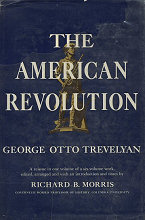
TREVELYAN : The American Revolution (fülszöveg)
In 1897, at the age of 59, a retired English politician and Cabinet Minister began a study of the struggle for American independence which reached completion seventeen years and six volumes later. His name was George Otto Trevelyan, nephew by marriage of Thomas Babington Macaulay, and father of the late historian George Macaulay Trevelyan. Despite all that has since been written on the Revolution, this work casts the same spell over the reader that it did over Theodore Roosevelt, who considered the British author "one of the few blessed exceptions to the rule that the readable historian is not truthful."
This abridgment aims at including the more original and enticing sections of the multivolume work – those pages that capture, as the editor says, "a frivolous and venal society, a corrupt political system, and a stubborn and myopic King – all set off against an idyllic if not over-idealized picture of American society." Most of the military treatment is omitted, as other readily available books deal with this aspect. The focus is on politics, manners, and ideas, the areas where Trevelyan's master touch is most apparent and wherein he is generally considered to have made his most enduring contribution. In the words of the editor, "no other volumes have succeeded in capturing as faithfully the drama, the wit, and the mariners of the generation that governed and lost the first British Empire"; and while the account does full justice to the Patriot cause, "nowhere else will one find a more sympathetic treatment of the British opponents of King and Ministry, whose stand may be said to have turned a revolution in America into a civil war in England."
The work, which was an international event in history and belles lettres when it appeared, has been out of print for a number of years and has never before been available in one volume. A whole new generation of readers may now enjoy, in Henry James' words, the "literary temper" of Trevelyan's work, "this beautiful quality of composition, and feeling of the presentation, grasping reality all the whole, and controlling and playing with detail."